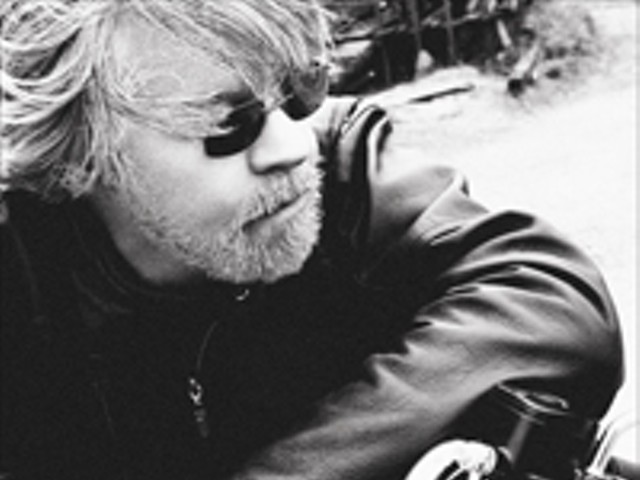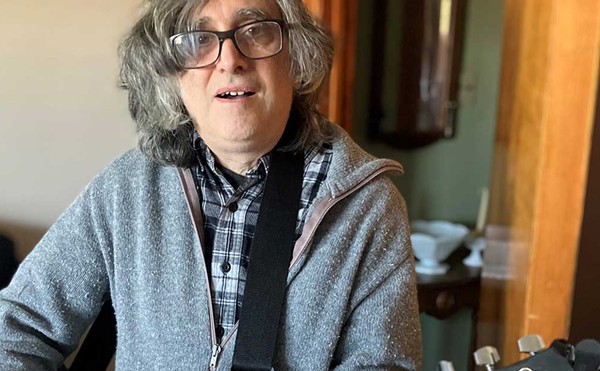Back in 1991, when saxophonist Ravi Coltrane first moved to New York City to play with renowned jazz drummer Elvin Jones, he didn't harbor any lofty aspirations of becoming an overnight sensation. In fact, Coltrane initially declined the offer — he felt he was just too inexperienced to play in Jones' band. He was John Coltrane's son, yes. But that didn't automatically make Ravi his father's musical heir.
"Those first couple of years with Elvin were hard for me. I could not play," the 41-year-old Coltrane says over the phone from the Brooklyn home he shares with his wife and two young sons. "I was scared that I was not at that level to be playing with Elvin Jones. I would ask him, 'What do you think I need to do?' I just didn't feel comfortable."
He hadn't started out on sax, or even with jazz. As a teen, Coltrane had played the clarinet, and was into James Brown, Stevie Wonder and Earth, Wind, and Fire. But that all changed in the late 1980s, when his older brother died. After that, Coltrane says he felt empty inside, so he did some soul-searching. He also started playing the tenor sax, and really began to explore his father's music.
"The music started to have a different effect on me," he says. "I started to go a little deeper and this transition happened where I was listening to primarily more jazz music and less of the other stuff. Jazz really spoke to me in a profound kind of way — it was no longer music that I just thought was kind of cool, but it was like a voice, you know, a real calling."
In 1986, he enrolled in the California Institute of the Arts, where he studied under bassist Charlie Haden. But he didn't graduate because, as he puts it, he spent most of his time practicing. After a move to New York, where Coltrane was determined to work exclusively as a sideman, there were folks who wanted him to record as a leader right away.
"I got a lot of offers to do recording dates. Even Bob Thiele [the producer who helmed most of John Coltrane's 1960s records for ABC], the first thing he said was, 'It would be great if you do a record and I could produce it and you could do all your father's tunes.' And he was the most sincere guy in the world. I immediately told him that I have respect for all the work that he did with my father, and my way of showing that respect is to not emulate it, or right out copy it," he says.
Even when the young Coltrane started recording as a leader, he only performed a handful of his dad's compositions. In 1997, after working as a sideman for seven years, a period that he describes as a musical apprenticeship — in a band led by drummer Jack DeJohnette, pianist Kenny Barron and saxophonist Steve Coleman — Coltrane recorded Moving Pictures, his first album as a leader. Since then, the saxophonist has recorded three more outstanding albums, From the Round Box, Mad 6 and In Flux. But it's the 2004 project Translinear Light that's his favorite, since collaborating with his mom (renowned pianist and Detroit native Alice Coltrane) was a dream come true.
Having resolved his personal relationship with the music — and having healed that nagging bruise on the soul that every heir to a legend confronts — Coltrane was ready to make an album like Translinear, and he knew his mother was too, despite not having recorded a straight jazz record since 1977's Transcendence.
But for someone who hadn't recorded much in more than a decade, Alice Coltrane's work on Translinear Light has all the depth and sparkle that made her albums A Monastic Trio and Journey in Satchidananda such classics. It's eclectic, celestial and melancholic in spots, yet it's very listenable as a jazz album, as the straightforward playing on "Blue Nile" and "Crescent" proves. Maybe it's too esoteric for genre purists, but it's likely that its spiritual tinge could only be achieved by an artist whose soul is as centered as Alice Coltrane's.
Ravi describes the recording process with his mother: "My mom was very cool about it, but she was still my mom. I didn't want her to have to work. I wanted her to play, to just really emote musically. She sounds great on the record. And I feel like I had a vision that I achieved."
Ravi Coltrane is an accomplished musician now, one who has worked hard, hasn't taken shortcuts and has never exploited the musical legacy his parents built. He started at the bottom and worked his way up. Best of all, he got to make an album that not only celebrated the Coltrane legacy, but contemporized it.
"What resonates for me is that I am a musician first," he says. "That is the golden prize."
Sept. 23, at Hill Auditorium, 825 N. University Ave., Ann Arbor; 734-763-3333.
Charles L. Latimer writes about jazz for Metro Times. Send comments to [email protected]





